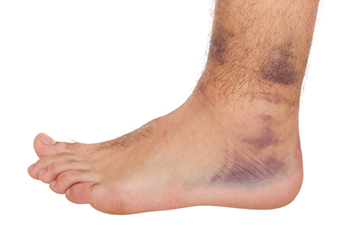Connect With Us
Blog
Items filtered by date: May 2024
Ankle Sprains and Peripheral Nerve Damage
 Ankle sprains, while commonly known for affecting ligaments, can also lead to peripheral nerve damage when the injury is severe. Peripheral nerve damage can occur when the nerves around the ankle are stretched, compressed, or torn during the sprain. Symptoms of peripheral nerve damage from an ankle sprain include tingling, numbness, or a burning sensation in the foot or along the ankle. Some patients might also experience a sensation of “pins and needles.” They may also have a lowered ability to feel touch, pain, or temperature changes. Severe cases can result in a limited ability to walk due to muscle weakness. Proper diagnosis and treatment are important to manage symptoms effectively. A podiatrist, or foot doctor, can use tools like nerve conduction studies to assess the extent of nerve damage. They may suggest various treatments, including targeted stretching techniques to strengthen and restore function and medications that help manage pain and nerve symptoms. To alleviate pain and minimize the risk of chronic ankle pain, it is suggested that you consult a podiatrist for treatment options.
Ankle sprains, while commonly known for affecting ligaments, can also lead to peripheral nerve damage when the injury is severe. Peripheral nerve damage can occur when the nerves around the ankle are stretched, compressed, or torn during the sprain. Symptoms of peripheral nerve damage from an ankle sprain include tingling, numbness, or a burning sensation in the foot or along the ankle. Some patients might also experience a sensation of “pins and needles.” They may also have a lowered ability to feel touch, pain, or temperature changes. Severe cases can result in a limited ability to walk due to muscle weakness. Proper diagnosis and treatment are important to manage symptoms effectively. A podiatrist, or foot doctor, can use tools like nerve conduction studies to assess the extent of nerve damage. They may suggest various treatments, including targeted stretching techniques to strengthen and restore function and medications that help manage pain and nerve symptoms. To alleviate pain and minimize the risk of chronic ankle pain, it is suggested that you consult a podiatrist for treatment options.
Ankle sprains are common but need immediate attention. If you need your feet checked, contact one of our podiatrists from Mt Rose Foot & Ankle Specialists. Our doctors can provide the care you need to keep you pain-free and on your feet.
How Does an Ankle Sprain Occur?
Ankle sprains take place when the ligaments in your ankle are torn or stretched beyond their limits. There are multiple ways that the ankle can become injured, including twisting or rolling over onto your ankle, putting undue stress on it, or causing trauma to the ankle itself.
What Are the Symptoms?
- Mild to moderate bruising
- Limited mobility
- Swelling
- Discoloration of the skin (depending on severity)
Preventing a Sprain
- Wearing appropriate shoes for the occasion
- Stretching before exercises and sports
- Knowing your limits
Treatment of a Sprain
Treatment of a sprain depends on the severity. Many times, people are told to rest and remain off their feet completely, while others are given an air cast. If the sprain is very severe, surgery may be required.
If you have suffered an ankle sprain previously, you may want to consider additional support such as a brace and regular exercises to strengthen the ankle.
If you have any questions please feel free to contact our office located in Reno, NV . We offer the newest diagnostic and treatment technologies for all your foot and ankle needs.
How Diabetic Patients Should Care for Their Feet

For people who have diabetes, foot care is not just a matter of comfort, it is imperative for preventing serious complications. High blood sugar levels can lead to nerve damage and poor circulation, increasing the risk of foot problems. Diabetic patients should inspect their feet daily for cuts, blisters, or signs of infection, and keep them clean and moisturized to prevent dryness and cracking. Wearing properly fitted shoes and socks is essential to prevent friction and pressure points. Regular appointments with a podiatrist are so important for diabetic foot care. Podiatrists can conduct comprehensive foot exams, assess nerve function and blood flow, and provide guidance on proper footwear and foot hygiene. They can also address any issues promptly, reducing the risk of complications such as diabetic ulcers or infections. If you have diabetes, it is strongly suggested that you schedule regular appointments with a podiatrist to safeguard your well-being and maintain mobility and comfort for years to come.
Diabetic foot care is important in preventing foot ailments such as ulcers. If you are suffering from diabetes or have any other concerns about your feet, contact one of our podiatrists from Mt Rose Foot & Ankle Specialists. Our doctors can provide the care you need to keep you pain-free and on your feet.
Diabetic Foot Care
Diabetes affects millions of people every year. The condition can damage blood vessels in many parts of the body, especially the feet. Because of this, taking care of your feet is essential if you have diabetes, and having a podiatrist help monitor your foot health is highly recommended.
The Importance of Caring for Your Feet
- Routinely inspect your feet for bruises or sores.
- Wear socks that fit your feet comfortably.
- Wear comfortable shoes that provide adequate support.
Patients with diabetes should have their doctor monitor their blood levels, as blood sugar levels play such a huge role in diabetic care. Monitoring these levels on a regular basis is highly advised.
It is always best to inform your healthcare professional of any concerns you may have regarding your feet, especially for diabetic patients. Early treatment and routine foot examinations are keys to maintaining proper health, especially because severe complications can arise if proper treatment is not applied.
If you have any questions please feel free to contact our office located in Reno, NV . We offer the newest diagnostic and treatment technologies for all your foot and ankle needs.
Managing Heel Pain

Heel pain, a common foot ailment, can significantly impact mobility and daily activities. Typically located on the underside or back of the heel, it can stem from various causes, including plantar fasciitis, Achilles tendinitis, heel spurs, or stress fractures. One prevalent reason for morning discomfort is the tightening of the plantar fascia ligament during sleep, leading to a sharp pain upon first steps. However, not all heel pains are alike. Pain can manifest in different areas such as the bottom, sides, or back of the heel, each indicating distinct issues. Ignoring persistent discomfort may exacerbate the condition and hinder natural healing processes. Fortunately, several remedies exist, including rest, stretching exercises, proper footwear, and custom orthotics. If you have persistent heel pain, it is suggested that you make an appointment with a podiatrist for an accurate diagnosis and tailored treatment plan.
Many people suffer from bouts of heel pain. For more information, contact one of our podiatrists of Mt Rose Foot & Ankle Specialists. Our doctors can provide the care you need to keep you pain-free and on your feet.
Causes of Heel Pain
Heel pain is often associated with plantar fasciitis. The plantar fascia is a band of tissues that extends along the bottom of the foot. A rip or tear in this ligament can cause inflammation of the tissue.
Achilles tendonitis is another cause of heel pain. Inflammation of the Achilles tendon will cause pain from fractures and muscle tearing. Lack of flexibility is also another symptom.
Heel spurs are another cause of pain. When the tissues of the plantar fascia undergo a great deal of stress, it can lead to ligament separation from the heel bone, causing heel spurs.
Why Might Heel Pain Occur?
- Wearing ill-fitting shoes
- Wearing non-supportive shoes
- Weight change
- Excessive running
Treatments
Heel pain should be treated as soon as possible for immediate results. Keeping your feet in a stress-free environment will help. If you suffer from Achilles tendonitis or plantar fasciitis, applying ice will reduce the swelling. Stretching before an exercise like running will help the muscles. Using all these tips will help make heel pain a condition of the past.
If you have any questions please contact our office located in Reno, NV . We offer the newest diagnostic and treatment technologies for all your foot and ankle needs.
It's Time for Beautiful Feet
Symptoms of Plantar Fasciitis

Plantar fasciitis occurs when the plantar fascia, a broad ligament that lies under the foot, becomes inflamed due to repetitive stress or strain. The hallmark symptom of plantar fasciitis is sharp, stabbing heel pain that can also radiate along the arch or sole of the foot. It typically worsens in the morning or after prolonged rest but often subsides with movement. Swelling and redness around the heel and arch area may accompany inflammation, and the affected area may feel tender or puffy. Stiffness and tightness in the foot can worsen throughout the day with increased activity. Discomfort in the foot's arch is also a common symptom of plantar fasciitis, limiting mobility and affecting daily activities. Pain and discomfort in the Achilles tendon may result from altered foot movement patterns caused by this condition. If you're experiencing any of these symptoms, it's suggested that you make an appointment with a podiatrist for a thorough evaluation and personalized treatment plan.
Plantar fasciitis is a common foot condition that is often caused by a strain injury. If you are experiencing heel pain or symptoms of plantar fasciitis, contact one of our podiatrists from Mt Rose Foot & Ankle Specialists. Our doctors can provide the care you need to keep you pain-free and on your feet.
What Is Plantar Fasciitis?
Plantar fasciitis is one of the most common causes of heel pain. The plantar fascia is a ligament that connects your heel to the front of your foot. When this ligament becomes inflamed, plantar fasciitis is the result. If you have plantar fasciitis you will have a stabbing pain that usually occurs with your first steps in the morning. As the day progresses and you walk around more, this pain will start to disappear, but it will return after long periods of standing or sitting.
What Causes Plantar Fasciitis?
- Excessive running
- Having high arches in your feet
- Other foot issues such as flat feet
- Pregnancy (due to the sudden weight gain)
- Being on your feet very often
There are some risk factors that may make you more likely to develop plantar fasciitis compared to others. The condition most commonly affects adults between the ages of 40 and 60. It also tends to affect people who are obese because the extra pounds result in extra stress being placed on the plantar fascia.
Prevention
- Take good care of your feet – Wear shoes that have good arch support and heel cushioning.
- Maintain a healthy weight
- If you are a runner, alternate running with other sports that won’t cause heel pain
There are a variety of treatment options available for plantar fasciitis along with the pain that accompanies it. Additionally, physical therapy is a very important component in the treatment process. It is important that you meet with your podiatrist to determine which treatment option is best for you.
If you have any questions, please feel free to contact our office located in Reno, NV . We offer the newest diagnostic and treatment technologies for all your foot care needs.
Blog Archives
- April 2025
- March 2025
- February 2025
- January 2025
- December 2024
- November 2024
- October 2024
- September 2024
- August 2024
- July 2024
- June 2024
- May 2024
- April 2024
- March 2024
- February 2024
- January 2024
- December 2023
- November 2023
- October 2023
- September 2023
- August 2023
- July 2023
- June 2023
- May 2023
- April 2023
- March 2023
- February 2023
- January 2023
- December 2022
- November 2022

